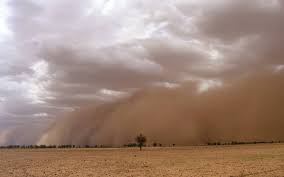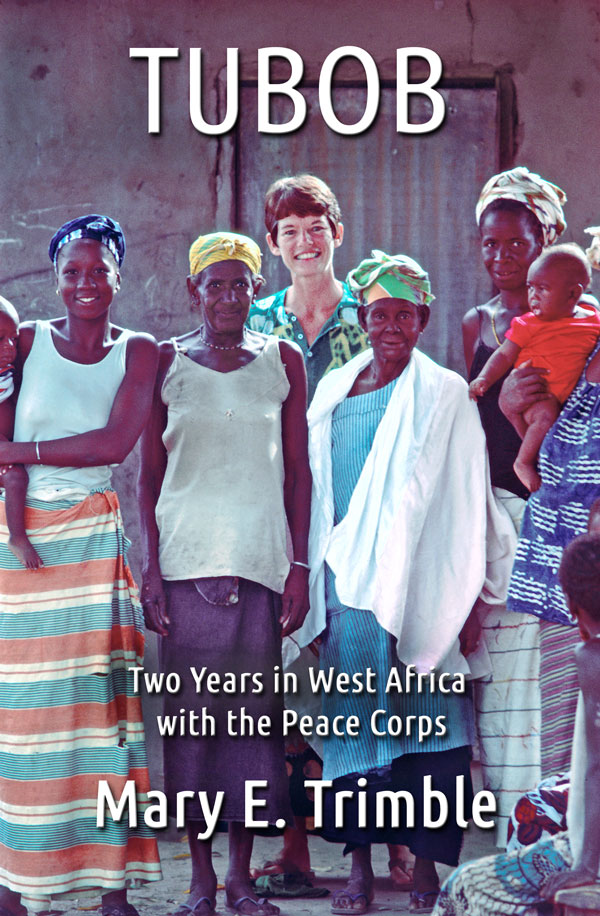
Sand! We woke up hot and sweaty, gritty with sand in our hair, teeth, our folded clothes, even our underwear. The harmattan had started about the time we went to bed.
“Now I know what a sugar cookie feels like,” I said to my husband, Bruce.
It was mid-March in The Gambia where my husband and I served with the Peace Corps (1979 – 1981). During the harmattan season, dry, dusty northeasterly trade winds blow from the Sahara desert over the West African subregion to the Atlantic Ocean.
We lived at the far upriver end of the tiny country near the town of Basse. Bruce worked as a Peace Corps volunteer for the United Nations in their fresh-water well division; I worked at the Basse Health Center. Since Basse is so remote and 250 very long and tedious miles from the capital city of Banjul (the last 120 miles an unpaved, rutty road), we often had house guests–people from United Nations headquarters, US AID staff, and Peace Corps people, either on business or as a get-away destination. This particular time we had two Peace Corps officials: George Scharffenberger, Peace Corps Director in The Gambia, and Terry (sorry, I can’t remember her last name), “The Gambia Desk” person from Peace Corps Washington, D.C.
Our living quarters included two structures. One was a mud-brick building, 10-feet wide and 30-feet long, with three rooms: a primitive kitchen with no running water (in fact, no sink), a dining/living room, and a guest bedroom. There was an 8-inch gap between the wall and the corrugated iron roof. The windows had no glass or screens but we did have leaky corrugated shutters that we rarely closed because of the extreme heat. The other structure, our “bedroom,” was a 15-foot round mud hut with a thatched-grass roof. The door was a screen tacked to a frame. Obviously, we had no real protection from sand driven by strong harmattan winds. The shared compound latrine was a hole in the ground in a fenced-in area about 150-feet from our hut.
The wind had picked up as we bid our guests goodnight. “This is going to be a real honker,” Bruce said. The next morning we swept the sand off our bed, shook out our clothes and went into the other building. A thick coat of sandy dust covered everything. We had to wash all our dishes, silverware and cooking pots before we prepared breakfast. I could see our guests becoming less and less enchanted with our home. Where George lived near the capitol city, there wasn’t much sand, and coming from Washington, D.C., Terry had never experienced such weather. Our guests left soon after breakfast. It appeared they couldn’t leave fast enough.
For us, the harmattan was simply a part of our West African experience. I was reminded of this incident when a dust cloud from West Africa recently reached the southern portion of the United States. I could almost feel the grit between my teeth.

In my memoir, Tubob: Two Years in West Africa with the Peace Corps, Bruce and I, newly married, discover ourselves in new light as we find both strength and frustration in a third-world culture. Caught up in a military coup, we seek refuge in a house with 116 other people and wonder if our lives will ever be the same.


Mary, I remember this from your book, TUBOB. What an experience. I marvel at your open-minded, non-judgmental writing about your experiences in West Africa. It is amazing how you adjusted to the surroundings.
Thank you, Hema. Even though it was sometimes hard, being in Africa fulfilled a life-long desire. I learned to take the good with the bad.
Mary: How you manage to stay so upbeat is an inspiration indeed. That quality must have been a requirement for Peace Corps volunteers. Don’t think I would be able to see the positive side of things. Bless you.
Judith, I’ve always thought that being married helped to get through some of the hard times in Africa. Having someone share the discomforts seemed reassuring. We could laugh at the craziness and even the hard times.
Learned a new word Harmattan. Thank you Mary
Stacey, thank you for your comment. It’s always fun to learn new words; not so much fun being in a harmattan!
I loved this book!! I recommend it highly to anyone and everyone. It’s just great!
Thank you, Irene. When we served with the Peace Corps in Africa, we asked our families to save all our letters home. Those letters served as a good reference when I wrote Tubob: Two Years in West Africa with the Peace Corps.